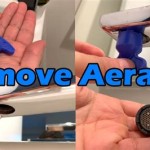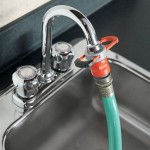Parts Of A Sink Drain
A sink drain is a plumbing fixture that allows water to drain from a sink. It is typically made of metal or plastic and consists of several parts, including the drain body, the strainer, the tailpiece, and the P-trap.
Drain Body
The drain body is the main part of the sink drain. It is a cylindrical or cone-shaped piece of metal or plastic that fits into the drain hole in the sink. The drain body has a flange at the top that rests on the sink surface and a threaded opening at the bottom that connects to the tailpiece.
Strainer
The strainer is a perforated metal or plastic disk that fits inside the drain body. It helps to prevent debris from entering the drain and clogging it up. The strainer is typically removable for cleaning.
Tailpiece
The tailpiece is a short piece of pipe that connects the drain body to the P-trap. It is typically made of metal or plastic and is threaded on both ends. The tailpiece allows the drain to be adjusted to fit the height of the sink.
P-trap
The P-trap is a U-shaped pipe that connects the tailpiece to the drainpipe. It is designed to trap water, which creates a seal that prevents sewer gases from escaping into the sink. The P-trap is typically made of metal or plastic and is removable for cleaning.
Other Parts
In addition to the main parts listed above, a sink drain may also include other components, such as a stopper, a lift rod, and a pop-up assembly. The stopper is a plug that can be inserted into the drain to prevent water from draining. The lift rod is a metal rod that is attached to the stopper and allows it to be lifted and lowered. The pop-up assembly is a type of drain that has a spring-loaded stopper that pops up when the water is turned off.
Installation
Installing a sink drain is a relatively simple process that can be completed in a few minutes. The first step is to remove the old drain. To do this, simply unscrew the tailpiece from the P-trap. Once the old drain is removed, you can install the new drain by following these steps:
- Apply a bead of plumber's putty to the flange of the drain body.
- Insert the drain body into the drain hole in the sink.
- Screw the tailpiece onto the drain body.
- Attach the P-trap to the tailpiece.
- Tighten all of the connections.
Maintenance
Sink drains require very little maintenance. However, it is important to clean the strainer regularly to prevent debris from building up and clogging the drain. You should also check the P-trap occasionally to make sure that it is not clogged. If you notice any leaks or other problems with your sink drain, you should contact a plumber for assistance.

Parts Of A Sink The Home

20 Parts Of Bathroom Sink Drain

Parts Of A Sink The Home

Sink Plumbing Hotsell Parts

Hugedomains Com

Parts Of A Sink The Home

Plumbing How To Remove Rusted Remains Of Kitchen Sink Tailpiece Home Improvement Stack Exchange

Bathroom Sink Plumbing Installation Diy Montreal

How To Install A Pipe From Sink Drain Wall Ehow

Brass Bathroom Click Clack Sink Waste Stopper Drain Parts Pop Up Bolt Basin Bath Topper Drainer Made In China Com







